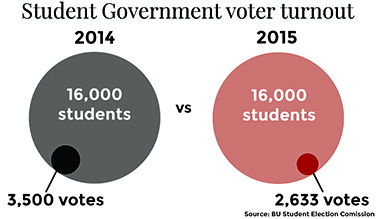[mediagrid cat=”20262″]
Boston University’s elections, held March 30 to April 6, saw a significantly lower voting turnout compared to the 2014 elections, according to the Student Election Commission.
This year, the elections attracted a total of 2,633 votes out of approximately 16,000 undergraduate students, a significant decrease from last year’s 3,500 votes, which the Daily Free Press reported on April 9, 2014.
Jasmine Miller, the SEC’s vice chair of rules, said voting turnouts had gradually increased over the years before 2014.
“This year’s turnout wasn’t necessarily low compared to other years,” she said. “It is a little lower than last year’s, but in previous years it’s been hitting over 1,500.”
Miller, a junior in the College of Arts and Sciences, said the SEC works to create new ideas for the campaign season to get students interested in the elections.
“Every year, new events make [the election] more relatable to student body,” she said. “We try to work with BU [students]. We have meetings and go over all of our events.”
This year the SEC added the Slate Speech Reception to the schedule. The reception was held on the first day of campaign week and allowed candidates to present their ideas and get in touch with potential voters, she said.
“We work every year to increase voter turnout and it’s hard, but it’s a process to see what works,” she said. “SG as a whole doesn’t have the most visible presence, so that decreases election awareness because if students are not already aware of [Student] Government, they won’t be aware of elections.”

Kaitlin Geraghty, a freshman in CAS and a candidate for executive vice president in CAS Student Government, said that the student body’s lack of interest toward SG stems from a miscommunication as to SG’s activities and influence.
“I think a lot of people don’t know what Student Government does here,” she said. “For a school that’s so large, I think a lot of people would like things to be done for them but don’t know how to advocate for themselves. That was actually a focus of our campaign, to let the students know what Student Government does and what we could do for them.
Though Geraghty said a personal interest in elections drew her to vote, she also understands how voting could bring a positive change to the BU community.
“I thought, by voting, I was doing my civic duty as a student here at BU and trying to promote general welfare for the student body and myself,” she said.
Geraghty said that SG reaching out to the student body can be a critical move in increasing students’ interest and awareness in voting and SG participation.
“Having a representative from the student government at orientation sessions would be great,” she said. “We should start with freshman, and letting them know that we have Student Government here and it’s a great thing to [be] involved [with].”
Several students said that there is an apparent disconnect between SG and the student body, which results in low election participation rates.
Emily Hayman, a junior in the College of Communication, said she did not vote because she felt unfamiliar with the students running.
“I didn’t feel like I knew enough about the different slates to make an informed decision,” Hayman said. “I didn’t hear anything specifically about what they were going to do and I personally didn’t want to vote on something that I didn’t know much about.”
Hayman said the election and the candidates running for office should be more visible to students to encourage higher voting turnouts.
“They need to make the information more readily available,” she said.
Erica Pierce, a sophomore in CAS, said the student government fails to garner sufficient attention from the student body.
“Our school is so huge that people do their own thing,” she said. “The idea of a student government doesn’t feel personal, so I think people don’t think that they need to care about having leadership … In a smaller bubble, like in high school, I think there was so much more of a connection to the people running [in elections] and what they were doing. Now it’s so big and everything feels more distant.”
Cory Azmon, a sophomore in the School of Education, said the distance between the student body and Student Government can be addressed through better campaigning efforts.
“The whole campaigning thing is getting out there and getting your name out there, and the only reason I voted this year was because someone campaigned to the right person,” he said. “It’s on the students who are campaigning to do more, not just focus on their organization, because I feel like [it’s] all very internal.”












































































































